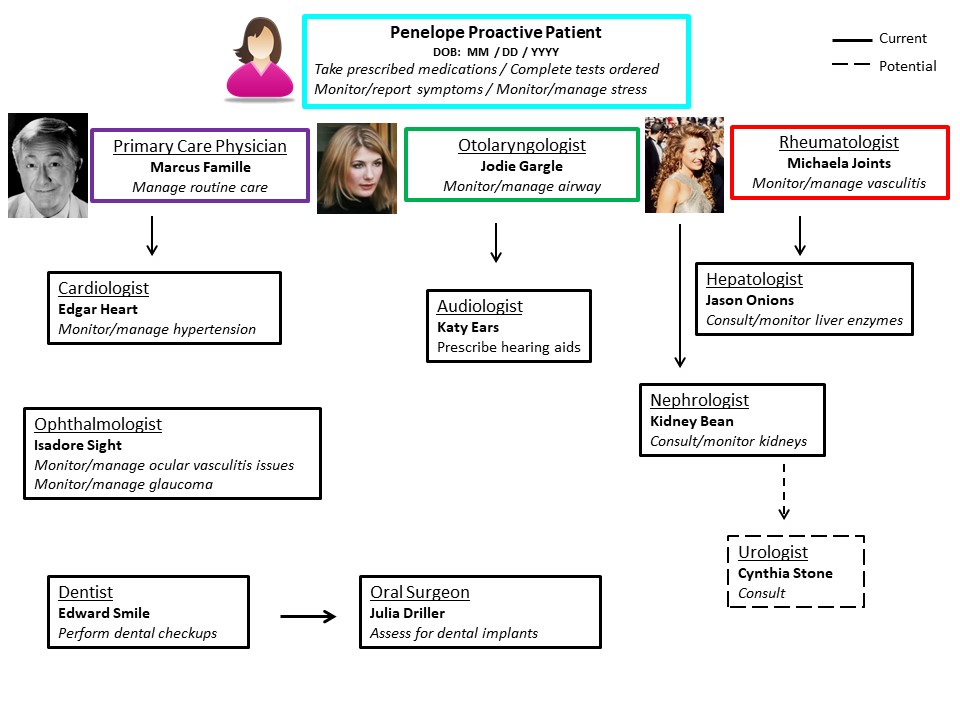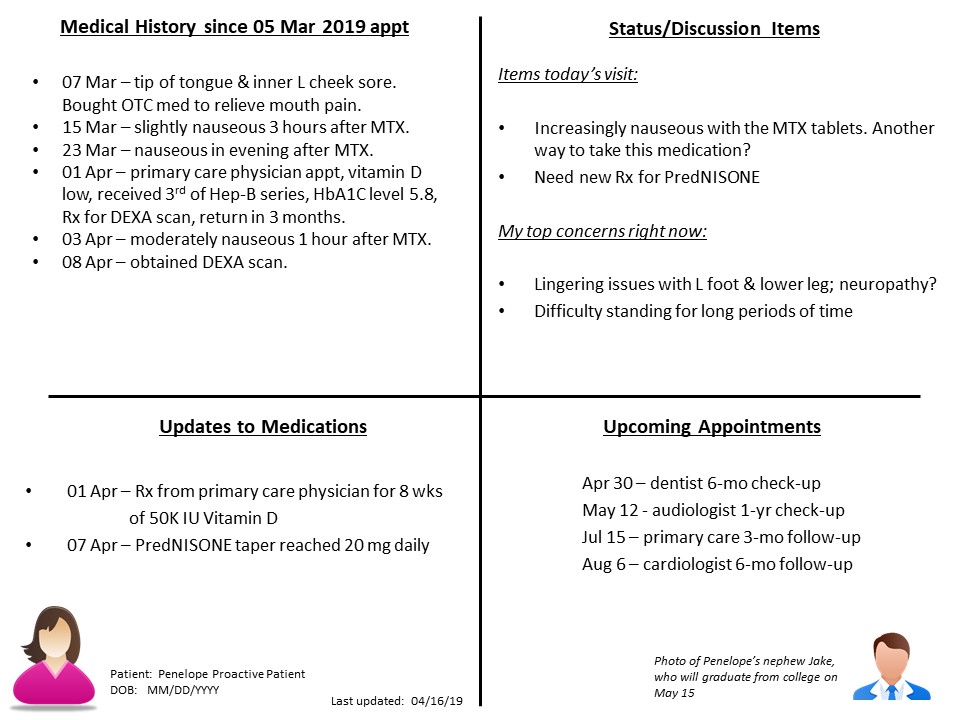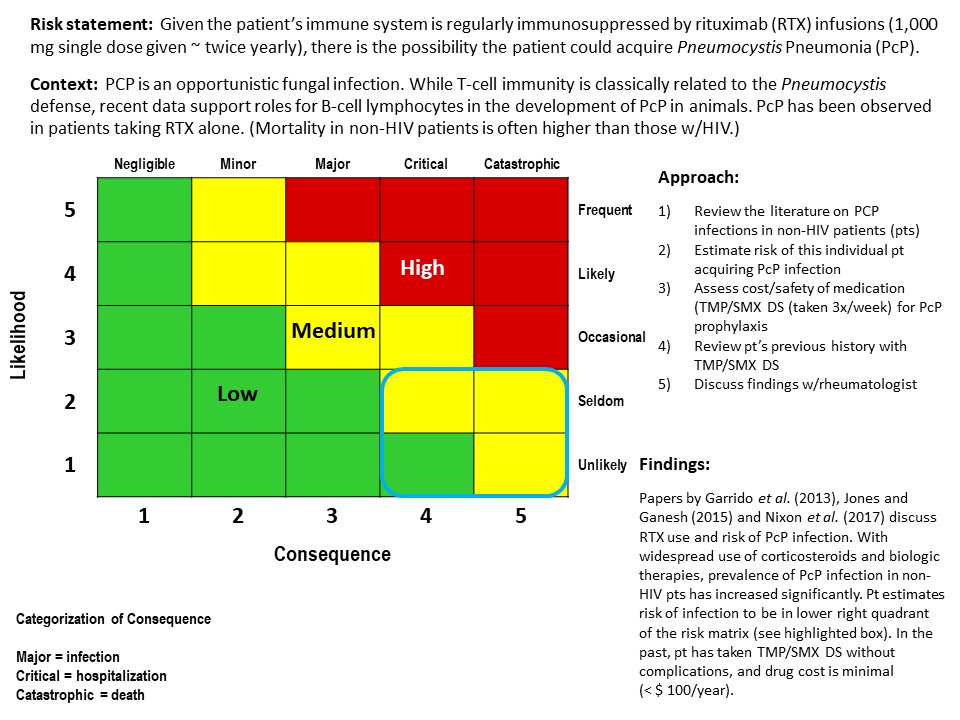Session Information
Session Type: Poster Session (Sunday)
Session Time: 11:30AM-1:30PM
Background/Purpose: For over two years, I experienced a variety of symptoms including: joint aches, sinus congestion, shortness of breath and chronic cough. An episode of hemoptysis led to laryngoscopy and a diagnosis of subglottic stenosis. Test results showed a high ANCA titer. Referral to a rheumatologist resulted in a diagnosis in 2012 of Granulomatosis with Polyangiitis (GPA), a rare disease with estimated incidence of 10-12 per million in the U.S. (Banerjee and Grayson, 2017). I’ve been hospitalized twice with relapses and received serial rituximab.
Treatment: To provide a framework for enhancing patient-physician communication, I applied work tools I use regularly: 1) an org chart, 2) a quad chart, and 3) a risk chart. I made my org chart about 6 months after diagnosis, updating it in 2018 to add photos. The chart lists my physicians, their specialties, and their roles in managing my health. I use a quad chart as a briefing tool for clinic visits to list medical history, updates to medications, topics I want to cover, and upcoming appointments. I made a risk chart to assess the likelihood of acquiring Pneumocystis pneumonia given I was having rituximab infusions. I used the chart with my rheumatologist in the shared decision-making process regarding trimethoprim/sulfamethoxazole for prophylaxis.
Maintenance: KQ: I first met this patient in 2015 during my rheumatology fellowship and became her clinical rheumatologist in 2017. The charts she provides help to inform and enhance our communications and coordination. The org chart provides an overview of other specialists involved in care and the quad chart highlights her main concerns to be discussed at the clinic visit. Additionally, her quad chart always includes a picture of a family member so that we discuss other important events going on in her life. These charts are an easy way to make sure we are addressing the patient’s health needs in an organized and efficient manner.
IH: Use of these tools has positively impacted communication with my physicians. With my org chart, a new doctor may see at a glance my medical team, as well as their faces. The quad chart provides a systematic way to organize my thoughts prior to a clinic appointment. The risk chart provides an assessment of benefits and risks for a given course of action as an aid to discussion with my physician.
I have a rare disease that all physicians learned about in medical school but most never experience in clinical practice. Consistent briefing tools for my clinic visits enhance the efficiency and effectiveness of the patient-physician interaction.
Quality of Life: I’m grateful my GPA remains quiescent. I appreciate my team of medical professionals who work in partnership with me to monitor and treat this rare, chronic, and potentially life-threatening disease. Shortly after diagnosis, I became a member of the Vasculitis Foundation, a patient advocacy group. In 2014, I joined a natural history study in the Vasculitis Translational Research Program at the National Institutes of Health. My six-word memoir is: “Thanks to research, living with vasculitis.”
Reference:
Shubhasree Banerjee and Peter C. Grayson. Vasculitis around the world: Epidemiologic insights into causality and a need for global partnerships. J Rheumatol 2017;44(2):136-139
Disclosure: I. Hakkarinen, None; K. Quinn, None.
To cite this abstract in AMA style:
Hakkarinen I, Quinn K. Framework for Enhancing Patient-Physician Communication in the Context of Rare Disease [abstract]. Arthritis Rheumatol. 2019; 71 (suppl 10). https://acrabstracts.org/abstract/framework-for-enhancing-patient-physician-communication-in-the-context-of-rare-disease/. Accessed .« Back to 2019 ACR/ARP Annual Meeting
ACR Meeting Abstracts - https://acrabstracts.org/abstract/framework-for-enhancing-patient-physician-communication-in-the-context-of-rare-disease/



